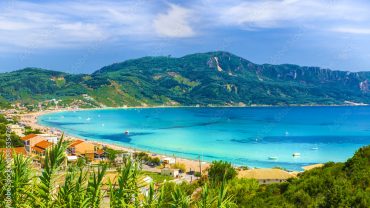🌿 Local Customs & Etiquette in Corfu, Greece
An essential guide by Litourgis Travel Acharavi & Litourgis Travel San Stefano North
Corfu, one of the most beautiful Greek islands in the Ionian Sea, offers much more than beaches and sunshine. Its charm lies in the rich cultural traditions, warm hospitality, and relaxed lifestyle that make every visitor feel welcome.
Before you arrive, it’s helpful to understand the local customs, etiquette, and traditions that shape daily life in Corfu. This guide will give you the essential travel tips to avoid cultural faux pas, show respect to locals, and truly enjoy the island like a Corfiot.
👋 Greetings & Social Etiquette in Corfu
- Say “Kalimera” (Good morning) when entering shops or cafés. In the evening, switch to “Kalispera.”
- Smile and be friendly—even if you don’t speak Greek, a warm greeting is highly appreciated.
- Handshakes are common; cheek kisses are reserved for close friends.
- Use Kyrie (Mr.) and Kyria (Mrs.) with surnames, especially with older locals or professionals.
👉 Tip: In our villages like Acharavi and San Stefano North, a friendly “Kalimera” will make you feel part of the community instantly.
🙏 Respecting Greek Traditions & Religion
Religion is deeply woven into Corfu’s culture:
- Churches & monasteries: Dress modestly and speak softly.
- Religious festivals: Easter in Corfu is famous for its unique traditions like the clay pot-throwing on Holy Saturday. Participate respectfully.
- Name days are celebrated even more than birthdays. Bring a small gift if invited.
🍴 Dining & Food Etiquette in Corfu
Food is at the heart of Greek hospitality:
- Meals are long, social, and never rushed.
- Wait for your host to start before eating.
- Dishes are shared—don’t hesitate to try a bit of everything.
- Tipping: Round up or leave 5–10%.
Must-Try Corfiot Specialties
- Pastitsada (beef or chicken pasta)
- Sofrito (beef with garlic and wine)
- Bourdeto (spicy fish stew)
- Kumquat liqueur
🚗 Lifestyle & Everyday Manners
Life in Corfu flows at a relaxed pace:
- “Greek time” means things are flexible—don’t stress if schedules shift.
- Roads can be narrow and lively—drive carefully and watch for scooters.
- Hospitality (Philoxenia) is natural. Accepting an offer of coffee or homemade sweets is a sign of respect.
📸 Photography Etiquette
- Ask before photographing locals, especially in villages.
- Religious sites often have photography restrictions—check signs first.
- Avoid photographing people’s homes or balconies without permission.
🌿 Embracing Corfu’s Unique Culture
Corfu’s history blends Venetian, French, and British influences, which you’ll see in its music, food, and architecture.
- Enjoy local music and dance at festivals.
- Respect olive groves and beaches—leave no trash behind.
- Learn a few Greek words:
- Efharisto (Thank you)
- Parakalo (Please/You’re welcome)
- Yamas! (Cheers)
✨ Do’s and Don’ts for Tourists in Corfu
✅ Do:
- Greet people with “Kalimera.”
- Try traditional dishes.
- Respect church dress codes.
- Accept hospitality.
- Learn a few Greek words.
❌ Don’t:
- Compare Greece negatively to other countries.
- Assume fluent English everywhere.
- Discuss sensitive politics.
- Photograph religious services without permission.
- Litter beaches or olive groves.
🏖️ Final Thoughts
Visiting Corfu is about more than sightseeing—it’s about connecting with its living traditions, people, and culture. By following these customs and etiquette tips, you’ll enjoy a more authentic and rewarding experience.
At Litourgis Travel Acharavi & Litourgis Travel San Stefano North, we encourage responsible and respectful tourism. Whether you’re joining a cultural excursion, exploring local villages, or booking a private transfer, traveling with awareness ensures Corfu remains a magical destination for generations to come.




Comment (0)